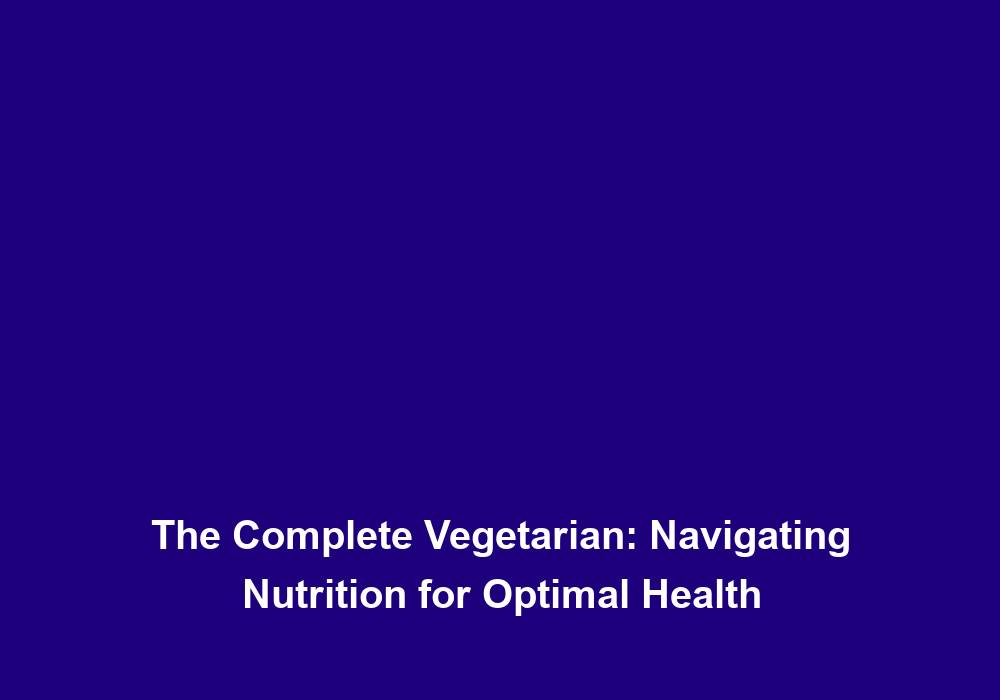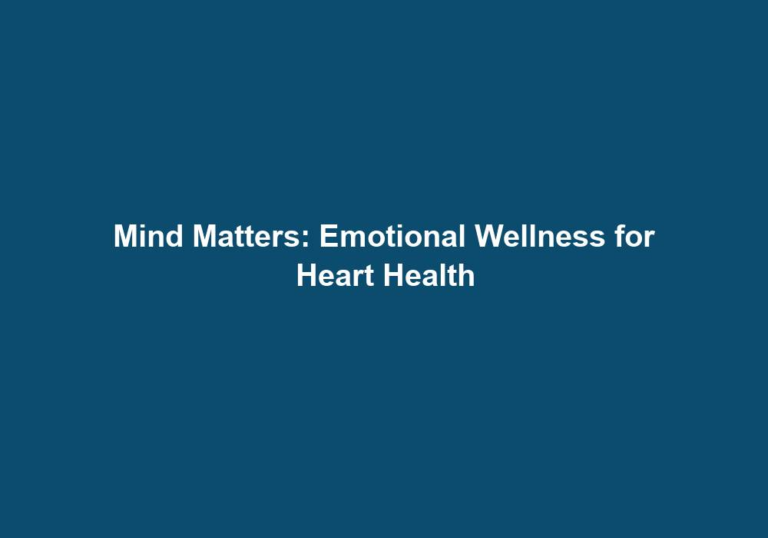The Complete Vegetarian: Navigating Nutrition for Optimal Health
Being a vegetarian is not just a dietary choice; it is a lifestyle that promotes compassion towards animals, environmental sustainability, and personal well-being. When following a vegetarian diet, it is essential to ensure that you are meeting all your nutritional needs to maintain optimal health. In this article, we will explore the key aspects of vegetarian nutrition and provide valuable insights to help you navigate your way towards a wholesome and fulfilling plant-based diet.
Understanding the Basics of Vegetarianism
Vegetarianism is a dietary practice that excludes the consumption of meat, poultry, and seafood. However, there are different types of vegetarian diets to suit individual preferences and beliefs:
- Lacto-ovo vegetarian: This is the most common form of vegetarianism, which includes the consumption of dairy products and eggs while excluding meat, poultry, and seafood. It provides a wide range of protein sources and essential nutrients.
- Lacto-vegetarian: This diet includes dairy products but excludes eggs, meat, poultry, and seafood. It is important to ensure adequate protein intake from plant-based sources.
- Ovo-vegetarian: This type of vegetarian diet includes eggs but excludes dairy products, meat, poultry, and seafood. It requires careful planning to meet calcium and vitamin D needs without dairy.
- Vegan: Vegans follow a plant-based diet that excludes all animal products, including dairy, eggs, meat, poultry, seafood, and even honey. It requires attention to meeting the nutritional needs of vitamin B12, iron, and omega-3 fatty acids.
Ensuring Adequate Macronutrient Intake
A well-balanced vegetarian diet should provide all the essential macronutrients – carbohydrates, proteins, and fats – in the right proportions.
Carbohydrates
Carbohydrates are the primary source of energy for your body. Include a variety of whole grains, such as quinoa, brown rice, whole wheat bread, and oats, in your meals. These grains provide essential nutrients like fiber, B vitamins, and minerals. Additionally, fruits, vegetables, and legumes also contribute to your carbohydrate intake by providing fiber, vitamins, and minerals.
Proteins
Protein is crucial for various bodily functions and is essential for building and repairing tissues. While animal products are rich sources of protein, vegetarians can obtain adequate protein from plant-based sources such as:
- Legumes: Lentils, chickpeas, black beans, and soybeans are excellent sources of protein. They also provide fiber, iron, and other essential nutrients.
- Quinoa: This pseudo-grain is a complete protein, meaning it contains all the essential amino acids. It is also a good source of fiber, iron, magnesium, and other nutrients.
- Tofu and Tempeh: Made from soybeans, tofu, and tempeh are versatile plant-based protein options. They are also rich in calcium, iron, and other minerals.
- Nuts and Seeds: Almonds, walnuts, chia seeds, and hemp seeds are packed with protein and healthy fats. They also provide fiber, vitamins, and minerals.
Including a variety of these plant-based protein sources in your meals ensures that you meet your protein needs while also obtaining other essential nutrients.
Fats
Healthy fats are essential for brain function, hormone production, and nutrient absorption. Include plant-based sources of fats such as avocados, nuts, seeds, olive oil, and coconut oil in your diet. These fats provide important omega-3 fatty acids, vitamin E, and other essential nutrients. However, remember to consume them in moderation as they are calorie-dense.
Key Micronutrients for Vegetarians
While macronutrients are crucial, micronutrients play a vital role in maintaining overall health. Here are some key micronutrients that vegetarians should pay attention to:
Iron
Iron is essential for carrying oxygen throughout the body. While meat is a rich source of iron, vegetarians can obtain it from plant-based sources such as:
- Dark Leafy Greens: Spinach, kale, Swiss chard, and beet greens are excellent sources of iron. They also provide fiber, calcium, and other important nutrients.
- Legumes: Lentils, kidney beans, and chickpeas are not only high in protein but also rich in iron. They also provide fiber and other essential nutrients.
- Fortified Foods: Certain breakfast cereals and plant-based milk alternatives are fortified with iron. These fortified foods can help meet iron requirements, especially for those with higher iron needs.
To enhance iron absorption, consume vitamin C-rich foods like citrus fruits, strawberries, bell peppers, and tomatoes along with iron-rich foods. The vitamin C helps in the absorption of iron from plant sources.
Calcium
Calcium is vital for maintaining strong bones and teeth. While dairy products are traditional calcium sources, vegetarians can obtain this mineral from:
- Fortified Plant-Based Milk: Opt for calcium-fortified soy, almond, or oat milk. These fortified milk alternatives provide calcium, vitamin D, and other nutrients.
- Leafy Greens: Broccoli, kale, bok choy, and collard greens are rich in calcium. They also provide fiber, vitamin C, and other essential nutrients.
- Tofu: Choose calcium-set tofu for an additional boost of this mineral. Tofu also provides protein and other nutrients.
Including these plant-based calcium sources in your diet can help meet your calcium needs and support bone health.
Vitamin B12
Vitamin B12 is primarily found in animal-based products, making it challenging for vegetarians to meet their requirements. Consider including vitamin B12-fortified foods like nutritional yeast, plant-based milk, and breakfast cereals in your diet. These fortified foods can help ensure an adequate intake of vitamin B12. Alternatively, consult your healthcare provider about B12 supplements to meet your needs.
Omega-3 Fatty Acids
Omega-3 fatty acids are beneficial for heart health and brain function. While fish is a common source of omega-3s, vegetarians can obtain them from:
- Chia Seeds and Flaxseeds: These seeds are rich in alpha-linolenic acid (ALA), a type of omega-3 fatty acid. They can be added to smoothies, oatmeal, or used as an egg substitute in baking.
- Walnuts: Walnuts are a great plant-based source of omega-3s. They can be eaten as a snack, added to salads, or used in baking.
- Algal Oil Supplements: Algae-derived supplements provide eicosapentaenoic acid (EPA) and docosahexaenoic acid (DHA), the active forms of omega-3s. These supplements can be taken to ensure adequate omega-3 intake.
Including these plant-based sources of omega-3 fatty acids in your diet can help support heart and brain health.
Balancing Your Vegetarian Diet
To ensure a well-rounded vegetarian diet, focus on the following tips:
- Variety: Include a wide range of fruits, vegetables, whole grains, legumes, nuts, and seeds to obtain a diverse array of nutrients. This variety ensures that you meet your nutritional needs and prevents boredom with your meals.
- Protein Combinations: If following a vegan diet, combine different plant-based protein sources throughout the day to ensure you are getting all the essential amino acids. For example, combining legumes with grains or nuts and seeds can provide a complete protein profile.
- Meal Planning: Plan your meals in advance to ensure you meet your nutritional needs and avoid any nutrient deficiencies. This helps in ensuring a balanced intake of macronutrients and micronutrients.
- Supplementation: Consider consulting a healthcare professional to determine if you need any specific supplements based on your individual requirements. Supplements like vitamin B12, vitamin D, and omega-3 fatty acids may be necessary for some vegetarians.
- Educate Yourself: Stay informed about the nutritional aspects of vegetarianism by reading reputable sources and consulting registered dietitians. This helps in gaining knowledge about the nutritional needs of a vegetarian diet and making informed dietary choices.
Embracing the Vegetarian Lifestyle
Transitioning to a vegetarian lifestyle can be a rewarding and fulfilling experience. By understanding the nutritional needs and making informed dietary choices, you can enjoy the benefits of improved health, reduced environmental impact, and a clearer conscience. Remember to always prioritize a well-balanced and varied diet to ensure optimal nutrition as a vegetarian.
Note: This article is for informational purposes only and is not intended to replace professional medical advice. It is always recommended to consult a healthcare professional or registered dietitian before making any significant changes to your diet.







